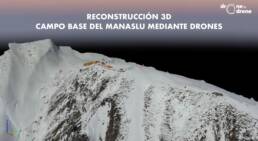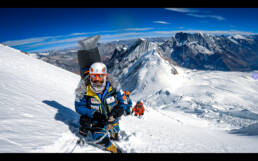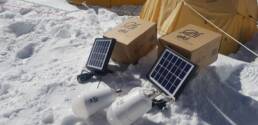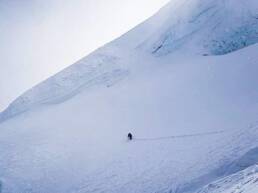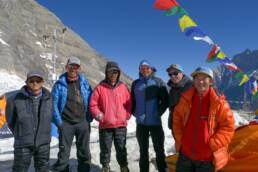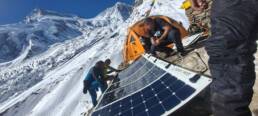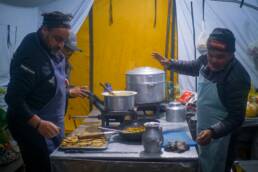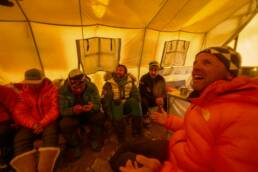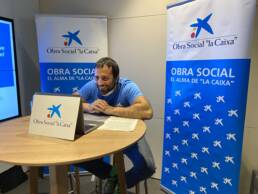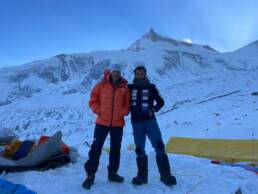ManasluEki BC Reconstruction in 3D using drones
As you know, in our expeditions, in addition to working hard in high altitude rotations, we also collaborate in development of environmental, technological, social projects ... In this case I want to tell you about the drones 3D reconstruction work done at #ManasluEki BC. A project we carried out with Drone by Drone, the first drone operating company authorized by the State Agency for Aviation Safety in Euskadi, and that, thanks to the use of UAS for monitoring, study interesting situations for the safe development and sustainable expeditions like the ones we carry out. Nothing is like teaming up with people from home and experts in their own business; thanks to them we have been able to share with you on my RRSS channels some very cool aerial images training in Gorbeia area and now a very special project in Manaslu.
The #ManasluEki BC 3D reconstruction project by drones has been possible thanks to the photogrammetric restoration technique using drones, which allows 3D reconstruction for the analysis of the environment.
It sounds convoluted, but I will explain what it consists of and what purposes these 3D reconstructions have in addition to the recreational purpose, because the digital model generated allows the measurement of multiple parameters on it, being able to export the information in multiple formats for its exploitation and analysis to GIS or CAD type programs
In this way, in the mountains, the use of drones not only provides spectacular images, but they can also provide us with data for subsequent analysis in important aspects as safety, sustainability, environment or local atmospheric phenomena.
- Analysis of the erosion generated by the human presence in base camps
- Presence of garbage and even possibility of volumetric measurement of it to determine mitigation and elimination measures
- Observation and measurements of seracs movements dangerous for climbers
- Glaciers observation and measurements, for the evaluation of their retreat or loss of mass due to climate change and human impact on them.
- 3d audiovisual content realization, for interaction , base camp virtual tours or interesting ascent areas tours. In this way, a more real immersion in climber’s daily life and in the expedition is achieved, and also to get the audience closer in a more realistic way, without having to submit to the risks of expeditions to Himalayas.
ManasluEki BC Reconstruction in 3D using drones
An unforgettable experience
We quite had it. It was close. We could almost touch it with our fingertips. But no, we have not been able to ascend to Manaslu. Some could consider that we have failed. Nothing could be further from the truth. We are very satisfied with the work done. And I'm not saying it to look cool. It's something that I really feel. I leave with a big smile and with the calm of having done everything in our power, with cool mind to make the decisions that made us return alive.
This is not like a football game, in which some win and others lose. The only time you lose in the mountains is when you don't come back from above. And this year, unfortunately, we had too much of this. I am so sorry that friends and colleagues didn't return home… It is the worst side of this wonderful sport that keep us so hooked. Too expensive the toll they had to pay. May they rest in peace. The world is a sadder place without them…
We have accomplished so many things throughout these unforgettable weeks. In sports and personally. We managed to ascend to 7,100 meters in the middle of winter and on a never explored route. It was beautiful, but also tough. Very hard. On some occasions I admit we have pushed a little harder than we should have, but I know that if we were in the same situation again we would do the exact same thing. We carried up many kilos of material and we opened track with more than a meter of snow, covered by the white blanket almost to the waist. We knew what we were up against and, in a way, we came to that. And if it hadn't been for that rimaye we found between first and second camps or if the window of good weather had lasted a day and a half more… Well, as they say, “it is what it is”. There will be time to analyze what we have done with more calm.
It has also been a great experience on a personal level. A fantastic group has accompanied me. I know that while I am focused on an expedition I can be more difficult to carry on. I keep focused and the machine in me comes out.
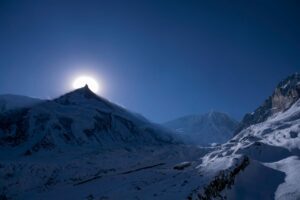
It has been a joy to go back to the mountains and first level mountaineering with a friend like Iñaki Álvarez. He really is a machine. A calm person, who never loses his temper, and who is always willing to give you a hand. The type of partner that we all want by our side when things go wrong. I have also learned a lot from Simone Moro, a top-level climber, and climbing comrade in several occasions. I will never forget how he mobilized everything he could on the day of Sergi Mingote's fatal accident. He told me about everything and I know he could not do anything more. Eskerrik asko to both of you for having accompanied me on this wonderful adventure. Surely we have many more to share.
I would like to say a few words to the wonderful group I had by my side at base camp. I am not going to list them one by one, because I would need almost one chapter for each and every one of them. Eskerrik asko to all of you. Your work at base camp made it possible for us to reach 7,100 meters.
And, of course, eskerrik asko, from the bottom of my heart, to all the sponsors who have made this 39-year-old kid enjoy this opportunity. I have done it in the best way I know, but in the mountains, no matter how much you prepare, you are at the mercy of the circumstances of each moment. It has been a wonderful journey. An unforgettable experience. Eskerrik asko!
EKI-SOS Himalaya: a high-altitude collaboration
The expedition we are carrying out this year has a marked humanitarian and solidarity value. I always try to make it that way, but this year it had to be more than ever. The pandemic generated by COVID-19 has hit all of Nepal very hard. Not so much at contagion level, but at economic level. The people here live largely from tourism and this year, as we all know, we have hardly been able to move from our countries. When I spoke with them on the phone before coming, they all passed the same idea to me: “We are suffering a lot. Everything is stopped and this is unsustainable. People are having a very bad time ”. Worry invaded his words.
I knew, therefore, what we were going to find. This is why, together with EKI Foundation, we got down to work. We had to think about how we could help them. Always within our means, of course. We are a committed but very small team with limited resources. But we had to find the formula. There are no excuses here. Nepal has given me so much and I always feel that I am indebted to them… In a way, I owe it to them.
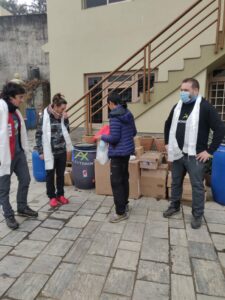
Well, after looking for formulas with EKI Foundation, we thought we could help them in two different ways: by giving them 60 autonomous light bulbs and by giving them the solar panels we have brought to Manaslu base camp that provide us with all the energy we need in our daily life.
But we needed to put a third protagonist into the equation. Someone to tell us where and to whom to deliver material. Someone who knew first hand and better than anyone Nepalese people’s needs. And here it’s where Iñaki Ochoa de Olza-SOS Himalaya Foundation came in. We got in touch with them and everything was very simple. Our job would be to receive EKI Foundation material and take it to Nepal. So we did it.
During our first week in Kathmandu we met with them and delivered the first batch of products: 60 autonomous LED bulbs, which can work thanks to a solar panel attached to them or which, if desired, can also be turned on with normal electricity (although cuts, as is common in some areas). That is to say, these bulbs have a lithium battery that is charged thanks to the sunlight or the electricity that can arrive. If it gets dark or the power supply goes out, the battery is charged and the bulb continues to work for up to 8 hours. A simple system, but extremely effective. In addition, these bulbs have a USB input and a microjack and the system can be activated with a remote control. A light bulb in a home can mean that girls and boys can study, that their day does not finish with the night.
Once we finish our expedition in Manaslu, we will deliver the second batch of material: solar panels that supply us with energy in base camp and prevent us from having to use generators and consume fuel (without forgetting the environmental impact we are avoiding). But first we have the challenge of climbing a giant of 8,163 meters, and it is not being so easy for us. Eskerrik asko to Iñaki Ochoa de Olza SOS Himalaya Foundation for helping us bring all this material to the areas where it is most needed and to Fundación EKI for making it possible. We are getting renewable energy to reach the most remote places on the planet and helping many families to improve their lives.
The payoff after hard work
We're destroyed. They have been days of a lot of work. As you know, a huge rimaye made us change our plans and that has made the climb very difficult. But it was worth it. The peace of mind that gives you having done an incredible job like the one we have done is very comforting. In addition, on a new route. Few more satisfying things like this one, really. The immensity of the place, so white and silent, the 'mushrooms' and 'popcorns' that we have found up there… it has been beautiful. We have suffered a lot, but we have enjoyed it much more. I am very proud of the team. Everything we have done is exciting. We can see the north peak of Manaslu very close! We have equipped almost up to 6,700 meters and we brought up quite all the necessary equipment for summit attack.
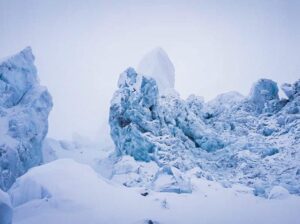
We had to equip the route for 3 intense days. It was new to us. We believe that no one has ever climbed it. In the absence of information, Chhepal, Kalden, Namja and I had to work hard to equip it little by little. Step by step, but without rest. We equipped much of the track between the four of us. On the other hand, Iñaki was in charge to carry up two good material cargos and Simone, Tenzing and Gelum equipped 350 meters of rope, from 6,325 meters to 6,450 meters. They continued what we started. Simone has also done an important job bringing up the rest of the material needed for summit attack to 6,650 meters. A 20 kilos backpack, almost nothing.
They have been days of many ups and downs. We even think about having to turn back to Bilbao at some point due to the difficulties we has. That rimaye could have been decisive, but we overcame the obstacle. With sacrifice, commitment and a lot of desire. But, above all, with a tremendous psychological work. The mountain forces you to do it, and I think we have far exceeded it.
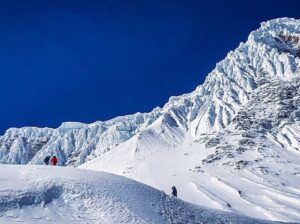
Now it's time to rest for a few days. But as weather permits, we are going up. We are quite optimistic and I think we made a lot of progress. The next step will be tough. Very hard. And, again, the mountain will test us. As it always does. But we are prepared.
The Sherpas, essential protagonists in our expeditions
Sherpas are, without any doubt, essential protagonists in all our expeditions in the Himalayas. Without them, it would be impossible for us to face challenges we purpose . Of course, Manaslu-EKI is no exception. They’re having a very important part in equipping the new route we are opening.
I would like, first of all, to thank this group that has suffered so much from the pandemic generated by COVID-19. The restrictions due to epidemiological situation around the world have stopped the majority of expeditions scheduled for this year . As you well know, also for us it’s been really hard to travel to Nepal. We sweated a lot to be able to organize everything, get all the papers the local authorities demanded us and, finally, spend a quarantine that delayed all our plans. As I told you, all these complications have made many people decide not to come this winter.
All these Sherpas live largely off people like us and tourists. Their main sustenance is expeditions and in 2020-2021 there have hardly been any. I was talking to you in another recent post about what several people told us during the trek to base camp: “you are one of the very few foreigners we have seen in recent months. Very few people have come since March and that for us is devastating ”. A heartbreaking message that makes us very sorry. We hope the situation changes as soon as possible and these people, like those of this entire region, will once again have a reliable income so that they can live in the most dignified way possible.
Having said all this, I would like to tell you about three Sherpas who are accompanying us on this adventure: Chhepal Sherpa, Kalden Sherpa and Namja Sherpa. Three wonderful people who are also magnificent professionals. Honestly, without their help and experience, all this we are experiencing would not have been possible. Namaste!
Cheppal Sherpa is the one who has been with us the longest. Since we tried to ascend Everest in winter, it has accompanied us on all our expeditions. He is the oldest of all and does the work of leader of the Sherpa team. He is a spectacular person, kind and polite. But above all, he is a machine in the mountains. His experience is fundamental to us and he works hard. The truth is that he leaves no one indifferent. Everyone who knows him I am sure will remember him all his life.
Kalden Sherpa started with us last year at Ama Dablam (the main peak is 6,812 meters above sea level). He is a very strong and daring person. A man of few words, one of those who find it difficult to get out what he has inside but, once you establish a relationship with him, he is a very nice and close person. If I had to highlight something about him, I would say he is very willing, that he never spare efforts. He has no problems working and that is very much appreciated when the moment of truth arrives.
The last of the protagonists is Namja Sherpa, a new member we have incorporated this time. Without a doubt, another 'machine'. What has impressed me the most is his physical strength. He is very strong. My friend Lur, whom I send a greeting from here and who had to leave the adventure earlier than we would have liked, was scared by his ability: “how this guy works, Alex. He has an incredible physical shape ”. He may know something about all this too. Welcome to the team, Namja, and a big thank you to all of you.
The importance of caring for our planet
Those who know me know very well the importance I give to caring for the environment. In addition, those accompanying me on my last expeditions experienced I am inflexible on this issue: it is our obligation to take care of nature. This is why, for example, I do not allow them to carry plastic bottles during our adventures and expeditions. And if I miss one, you can be sure you are going to bring it down and deposit it where it is due. I am aware I can be heavy and uncompromising but my commitment makes me act in this way.
For several years I have liked to get involved in projects helping our planet. Or that, at least, they make our passage leave the least possible footprint on earth. We have already punished her too much for many years. In addition, I try to ensure that my expeditions have a strong sustainable character. To continue with the example of water, instead of bringing up cans, what we do is treat the water provided by snow or ice.
Trust me, I don't do all this because it's cool. As I say, it is something that I have deep inside. At home they taught me to take care of nature and the importance of helping those who need it most and I do it in the best way I know. Many times, when I go to the mountains near my town (Anboto, Mugarra, Gorbea ...), I stop training to start collecting all the plastics that I see around me. I always end up coming down with a few kilos of garbage that other people have left behind. It's something I have inside. My eyes hurt when I see garbage in the mountains.
This personal commitment made alliances emerge in a very natural way with the ENTE VASCO DE LA ENERGÍA and the EKI Foundation. Institutions with whom I share vision and values, like those friends with whom with just a glance you say everything.
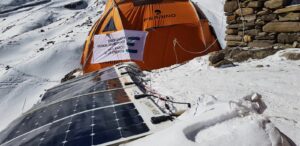
What Fundación EKI does is absolutely interesting. I fell in love when they told me about the project several years ago. To sum it up in a few words, they focus their efforts on supplying autonomous electrical energy sources (mainly photovoltaic solar) to educational, health, and social interest centers in developing countries, especially in Africa. They have been doing it since 2017. And the thing is that on the planet there are still, according to what they told me, more than 1,000 million people -one in seven- without access to electricity, of which 600 millions live in Sub-Saharan Africa. Very hard.
For this year's expedition, as they did when we went to Everest in 2019-2020, the EKI Foundation has provided us with solar panels that allow us to avoid energy supply problems in base camp. We take advantage of the sunlight and these plates to supply ourselves 100%, without the need for power generators (and fuels). Up here we use many devices that need energy: batteries, telephones, radios, computers, weather stations, drones ... well, we are not going to use a liter of fuel. Something we are very proud of.
Eating like at home
If food is important in any aspect of life, it is even more at almost 5,000 meters of altitude, where we have installed our base camp. And, of course, for me it is essential the help of a great cook and friend who has accompanied me in 4 expeditions: Eneko Garamendi. Without him, everything would be much more complicated. I have been telling you things about these days but I think the subject of food deserves its own chapter. May those lines thank Eneko, a great altitude chef.
As you can imagine, it is not easy to cook in these circumstances. First, because we have to bring a lot of food to feed everybody here. It is not the same to have to prepare food for 2 people or for a dozen (another day I will tell you who team members are). And, then, because having fresh food is impossible and that complicates everything a lot.
As good basque people we are, we love to eat (thanks to BM Supermarkets, which provided us with a lot of food for the expedition) and we give great importance to this aspect. If you want, ask my partner and friend Simone Moro. I quote the beautiful words he told Eneko: “of all the expeditions that I have been, this is, without a doubt, the one where I am eating the best. I dream of the menu you prepare ”. The truth is that after the beans he ate, I understand him. Anyone would have said the same. They were spectacular.
Breakfast -coffee with omelette or boiled eggs and some cookies- is usually prepared by our Nepalese colleagues Ringi and Raju, the cooks working for the Sherpas with us. They always bring their own cooks because they don't usually eat what we prepare. Normally, they eat dal baht, the typical Nepalese recipe. Eneko always offers them our food. They try it, they say thank you very politely, but that’s all. Everybody has its own traditions, I suppose. And I love seeing all this variety and mixture of cultures.
After breakfast, sometimes we make our 'hamaiketako' (typical basque snack at around 11 in the morning) and we prepare for lunch. We eat everything and very varied: cod, lentils with knuckle, entrecote (thanks, Cárnicas Alejandro Goya!), chicken, chorizo (Palacios has helped us a lot), duck, paellas ... As you can imagine, pasta is usually the elite dish, for all that it brings us. Eneko mixes it with everything, from minced meat to canned vegetables. Speaking about tinned food, we eat a lot of tuna, anchovies or sardines, provided by our sponsor Isabel.
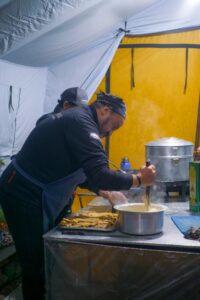
As I was saying, it is impossible to have fresh food, it immediately freezes and then it doesn’t look so good. In this sense, it is very difficult for us to eat fruit, because it is very difficult to maintain it properly. But we cannot pretend to eat like at home, although we are very close since Eneko joined the team. After lunch, in the middle of the afternoon, we like to have coffee and cookies for a snack and, before going to bed, we have dinner. Most of the time soup, which with a couple of glasses provides us with half the daily water we need.
We store meat and fish in drums outside the tents. There they are kept frozen. We have the rest distributed in every tent, always in a safe place. Eneko has everything under control (and guarded). He has everything so calculated that I think he thought about what we will eat on the 30th day of the expedition ... but we need him to do it that way. Food, as I was saying, is essential in this type of adventure. Eskerrik asko sukaldari!
The best and worst of the mountain
These last fews days here in the Himalayas have not been easy. Last nights I've been awake. Sergi Mingote's death was a bucket of cold water in my face, a terrible news that we didn't expect at all. Just putting myself in the shoes of Tamara Lunger or Mingote´s family ... gives me goosebumps. I send them a big hug.
It is true, who lives this life, and since long time, understands we take many risks, that climbing this kind of mountains is not a nice walk. But you are never ready for this kind of "hit". It is terribly difficult to see someone passing away so young and due to an unfortunate accident.
It was my climbing partner Simone Moro who gave me by radio the two important news of the day while we were triyng to move little bit higher than camp 1. “Alex, Mingote had an accident and we will help him as we can. It looks serious”. I was frozen. He then added: "The Nepalese team managed to summit K2”. Two conflicting reports that have undoubtedly and totally changed my mood. On the one hand, a good man was dead and, on the other, the Nepalese people had accomplished an important feat of which I was very happy. A bittersweet sensation invaded my body.
Next step was clear to me: out of respect to Mingote, we had to go down to base camp. It was my way of mourning him. To show him my consideration. At first it wasn’t a joint decision, but it was firm and very determined. It was something that had to be done. To be respected, you must learn to respect. So I did. Rest in peace, my friend.
Finally, my sincere congratulations to Nepalese team. Hip hip hurrah! You don't know how happy I am for them. For decades they have been helping people like us to achieve our dreams and this week it was they who realized their ones, entering history from the front door. I read with amazement the criticisms of some purists. How can we fault some of them to have used oxygen? Isn't it hard and honest enough to summit K2 in the dead of winter? What else needs to be done to make people accept that what they did was not accomplished by anyone before in history?
I do not share these criticisms at all. After spending so much time in the shadow of expeditions like ours, they have been the protagonists of their own story, bringing Nepalese flag to the top. So, congratulations! You have enormous merit. It’s a shame this news coincided with that of Sergi Mingote's death. The mountain is like that. It can give you and take everything away from you. This is part of it. And we accept it.
Helping others
I believe there is nothing more rewarding than helping others. Doing it selflessly multiplies the level of satisfaction exponentially. Everyone, absolutely everyone, needs help at some point. For this reason, I am particularly excited to have been involved in the 'Encuentros de Altura' project, joining CaixaBank, whose agencies network identifies local social organizations needs and supports La Caixa Foundation in its solidarity initiatives by channeling part of their budget. What are the ‘Encuentros de Altura’? Well, an initiative that aims to stimulate and motivate guests of retirement homes, which is one of the priority lines of La Caixa Foundation and of CaixaBank, and even more now in this situation. And also, to recognize the staff working in these centers, who are doing an excellent job in this complicated context. Really, thank you for giving me this gift. I feel privileged.
The pandemic generated by COVID-19 has hit our society hard, but especially our elderly. They are the ones who suffered the most. On the one hand, because they were the most vulnerable and, on the other, because those who live in a retirement home experienced their freedom reduced to the four walls of their rooms. And this is something very difficult. I can't even imagine what many of them have been through.
When I was offered to spend a few hours chatting with them, I didn't think it twice. I knew it would be a pleasure and I would learn a lot from all of them. I didn't know what I could give them in return. What could I teach to people who have lived much longer than I have? It was me who should have been listening to them. After several meetings I must say my expectations have been greatly exceeded. I am learning infinitely more than I thought and I hope they are enjoying this experience as much as I am.
The ‘Encuentros de Altura’ project aims to take for a while old people to the mountains through anecdotes we tell. Now it’s time to continue being with them, we are blessed to have the technology to be in contact and this "feeling close" has an incredible benefit on their mood. There are testimonies that, without exaggerating, give me goosebumps. One of the elders, a great mountain lover, told me that the best gift he could receive was to listen to me. And another one who, according to what Matia Fundazioa tells me, is usually a lonely person, after listening to me, wanted immediately tell his sister about that experience and asked to repeat the call to show me some of his photos in the mountains. So we can realize how many things can be changed with so little. And I have already told them I can’t wait to finally meet and I hope also to go together to the mountains.
New technologies allowed people hardened by a thousand battles and me to feel close to each other. So close that, as I said, we got excited in many moments. Many thanks to all these people who decided to share with me one of the most important things in life: time. As I said, I feel very lucky.
Now I’m in a new adventure: trying to climb Manaslu (8,163 meters above sea level) in winter, a challenge never done before. Even so, I keep in touch with them these days. Not directly, but through videos I send them. I tell them about our progress, our afternoons having tea and playing cards, even about frustrations and bad times we have when things don't go as planned. We all stumble, no matter how old we are. When I’ll be back I will tell them everything I have experienced, although as before I am pretty sure they will always be the ones who have the most to offer.
After a long journey and a week of trekking… here we are at base camp!
We are finally at Manaslu base camp. It wasn't easy at all, really. After leaving Bilbao on New Year's Eve, we landed in Nepal on January 1st. First we had to go through several bureaucratic procedures at the airport, then four-days quarantine (so long!) without leaving our hotel in Kathmandu, and some covid tests that the whole team had to do. To give you an idea of how complicated it was, my friend and climbing partner, the Italian Simone Moro, lost his flight in Italy due to the strict procedures he passed through. But we got it. The first stage is over and this beautiful mountain welcomes us with open arms!
Once the procedures indicated by the local authorities were completed, we had to reset all our stuff and the itinerary to make a shorter trekking, as quarantine we did had upset all our plans. At our hotel in Kathmandu we held an emergency meeting and rearranged everything in order to make the trip as short as possible. Because of this change we had to sacrifice a fundamental action in this type of expedition: acclimatization in altitude.
We valueted trekking period and adaptation to altitude and we were forced, in order to take advantage of good weather and because of our desire to leave, to shorten the trip. It was not an easy decision, as although I am a professional alpinist, I am accompanied by a team in which some members are not used to this type of adventure. But I think the decision was the right one and I'm very proud of all of them, because they reacted in an amazing way. Thank you very much, and congratulations!
Another important decision was to send the cargos to Samagaon, the last town before base camp, instead of transporting them directly by helicopter. And the reason is very simple: this region, which lives largely on tourism and expeditions, is suffering so hard the pandemic generated by COVID-19. And according to what several people told us, we have been the only foreigners in the area in recent months. Our idea was to employ people, to carry cargos and equipment from Samagaon to base camp, because people like me owe to local people a lot.
I know this is nothing more than a "gesture", which will not solve the real problem, but I believe that if you can help with anyone in this life, you have the moral duty to do it. I knew what we were going to find before we arrived and it was our humble way of contributing. This gesture is for them.
With all the equipment loaded onto the helicopters, our journey to base camp began. First of all, we did a long trip by bus and 4x4 vehicles to Machhakholagaon, the gateway to a trekking that has taken us a week. After spending the night in this city, we took our backpacks and started walking. A journey through cities as Dohan, Bihim, Philim or Namrung, accumulating more than 3,500 meters of elevation gain.
The truth is that I remembered this trek very well but it didn't stop surprising me. The weather was also helping us and the atmosphere was great. A tour that I recommend to everyone, with spectacular views. Of course, once again the hard reality showed us how much local people are suffering. For example, Lakpa, from "Lodge Thakli", told me that since March we were the second group of tourists here, and this is terrible for a region that depends on people like us. He told me about it with a smile on his face, but he couldn't hide his concern. It is curious to see how these people never lose their good humor and happiness. At least that's what it looks like. They will hide their concern deep inside, I guess.
Motivated by his unbeatable attitude, we continued our journey laughing and telling anecdotes. I think we got along very well and for me this is fundamental. Complicated days will come and so to know each other in advance is very important. Everyone contributes in some way to the team atmosphere and I like watching the group walking towards the giant that's waiting for us. We have reached base camp and we have a lot of work to do, but being here, in a so complicated situation like the current one, is already a reward. As well as seeing the group smile and the local people happy to see us.
Manaslu looks at us from above and we won´t miss it until we will have to leave for Bilbao. We hope with the same smile we are carrying from the beginning of this adventure. I'm sure it will be like that.

